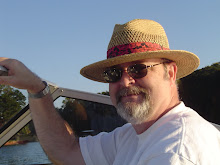Progress marches on as I continue to build the mountain area
The latest progress is building the mountain to the right of Misty Falls. I use the cardboard web / plaster cloth method as that's what I'm comfortable using. It's no better or worse than other methods, but since I've got a bunch of plaster cloth, why not?
**** Click on pictures for a larger view ****
I start by punching holes at the top of the mountain in the foam "distant" mountains and feeding through a piece of cardboard web, which I wrap back around and glue it to itself. As the woven web is made I hot glue each junction. Some like to staple the intersections, but to me glue is easier. While the glue is setting I use clothes pins to hold things together. The web is complete and it took about 45 minutes.

The web needs some individual hills and I find it easier to do this by using wads of paper and tape them in place. With this method I can easily move them around, add, adjust, etc. Here I've added contours to the top of the mountain and about 1/3 of the way down.

I saw a hint in a magazine (don't remember which one) that suggested covering the cardboard web with masking tape. I like this idea for these reasons: 1) It helps me to visualize the area and contours without actually applying the plaster cloth; 2) By not pressing down the tape on each web strip, I can "bridge" the strips to make smoother hills without the "ribs" that sometimes show when cloth is added directly to the web; and 3) With the tape I can seal edges so the plaster cloth doesn't droop through gaps / holes. The taping process took about 15 minutes.

The fun part - applying plaster cloth! I start by apply a double thickness (pieces folded in half) around the edges. Next, I apply larger pieces starting at the top and overlapping each piece by 50%. The result is the entire area is covered with at least a double layer of plaster cloth in less than 45 minutes.
The latest progress is building the mountain to the right of Misty Falls. I use the cardboard web / plaster cloth method as that's what I'm comfortable using. It's no better or worse than other methods, but since I've got a bunch of plaster cloth, why not?
**** Click on pictures for a larger view ****
I start by punching holes at the top of the mountain in the foam "distant" mountains and feeding through a piece of cardboard web, which I wrap back around and glue it to itself. As the woven web is made I hot glue each junction. Some like to staple the intersections, but to me glue is easier. While the glue is setting I use clothes pins to hold things together. The web is complete and it took about 45 minutes.

The web needs some individual hills and I find it easier to do this by using wads of paper and tape them in place. With this method I can easily move them around, add, adjust, etc. Here I've added contours to the top of the mountain and about 1/3 of the way down.

I saw a hint in a magazine (don't remember which one) that suggested covering the cardboard web with masking tape. I like this idea for these reasons: 1) It helps me to visualize the area and contours without actually applying the plaster cloth; 2) By not pressing down the tape on each web strip, I can "bridge" the strips to make smoother hills without the "ribs" that sometimes show when cloth is added directly to the web; and 3) With the tape I can seal edges so the plaster cloth doesn't droop through gaps / holes. The taping process took about 15 minutes.

The fun part - applying plaster cloth! I start by apply a double thickness (pieces folded in half) around the edges. Next, I apply larger pieces starting at the top and overlapping each piece by 50%. The result is the entire area is covered with at least a double layer of plaster cloth in less than 45 minutes.
A closeup of the lower rock section. Next will be adding the grass mat.











No comments:
Post a Comment